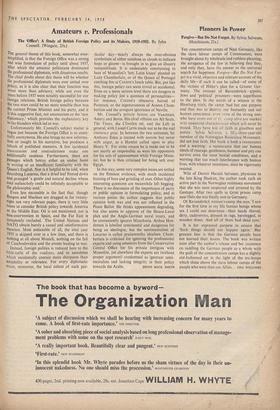Amateurs v. Professionals
Tim general theme of this book, somewhat over- simplified, is that the Foreign Office was a strong and wise formulator of policy until about 1937, after which the amateur politicians dominated the professional diplomats, with disastrous results. The chief doubt about this thesis will be whether the professional diplomats were ever united over Policy, as it is also clear that their function was never more than advisory, while not even the Years before 1937 were notably successful for our foreign relations. British foreign policy between the two wars could be no more sensible than was the current Prime Minister and his party, and it is this suggestive fact, not amateurism or the 'new diplomacy,' which provides the explanatory key to the blunders which led to war.
Unfortunately. Mr. Connell's subject matter is vague just because the Foreign Office is so essen- tially anonymous. He also brings no new informa- tion or insight to his narrative, but produces a rehash of published memoirs. A few incidental inaccuracies and contradictions make one additionally cautious. Furthermore, there are Passages which betray either an undue haste in writing or an insufficient familiarity with the Queen's English. Nor is it helpful to be told, when describing Locarno, that a dried leaf floated down and presaged 'a gentle and natural decline whose Cool melancholy could be infinitely acceptable to the philosophic soul.'
Even less excusable is the fact that, though Burgess and Maclean are dragged in for twenty- eight not very relevant pages, there is very little room to consider British policy towards America or the Middle East. Oil is not mentioned, nor is non-intervention in Spain, and the Far East is Completely excluded. The United Nations and NATO obtain barely a casual and uninformative mention. Most noticeable of all, the vital year 1939 is skipped over in a few lines, and there is nothing at all about Munich, nothing on the fall of Czechoslovakia and the events leading to war.
Instead, foreign politics is reduced here to the tittle-tattle of the coulisses, and to anecdotes which incidentally contain more sharpness than amiability or relevance. For every diplomatic event, moreover, the local colour „of each par-
ticular day—nearly always the over-obvious symbolism of either sunshine or clouds to indicate hope or gloom—is brought in to give an illusory verisimilitude. It is undeniably entertaining to hear of Mussolini's 'hot, Latin kisses' planted on Lady Chamberlain, or of the Queen of Portugal catching fire at Curzon's lunch table. But, put like this, foreign policy can seem trivial or accidental. Even on a more serious level there are dangers in making policy just a question of personalities— for instance, Curzon's obsessive hatred of Poincard, or the ingenuousness of Austen Cham- berlain and the arrogant ignorance of Neville.
Mr. Connell's private heroes are Vansittart, Amery and Bevin. His chief villains are All Souls, The Times, the Cliveden set, and the Left in general, with Lionel Curtis made out to be the real eminence grise. In between the two extremes, Sir Anthony Eden is treated with sorrow but never with anger, as a Hamlet called upon to play Henry V. For some reason he is made out to be not nearly so responsible as were his opponents for his acts of appeasement while Foreign Minis- ter, but he is then criticised for being soft over Egypt.
In this way, some very complex issues are settled on the flimsiest evidence, with much incidental buzzing of bees and grinding of axes. Other highly interesting questions are meanwhile left begging. There is no discussion of the importance of party or public opinion in formulating policy, and at various points the author suggests that public opinion both was and was not reflected in the Peace Ballot. He thinks appeasement degrading, but also seems to approve of the Hoare-Laval plan and the Anglo-German naval treaty, and he conveniently ignores Manchuria. Arthur Hen- derson is labelled sentimental and dangerous for being an ideologue, but the sentimentalism of Locarno is called praiseworthy idealism. Cham- berlain is criticised for ignoring the professional experts and using amateurs from the Conservative Central Office for his private intrigues with Mussolini, yet elsewhere the experts are (without proper argument) condemned as ignorant senti- mentalists and lacking integrity in their policy






























 Previous page
Previous page